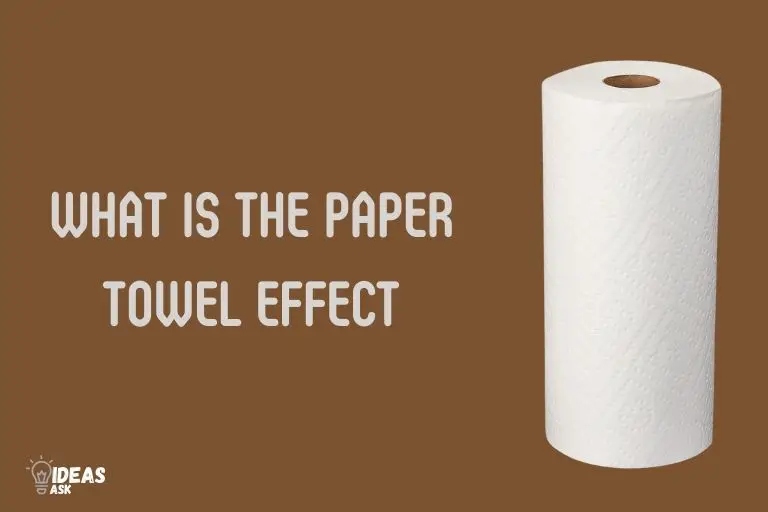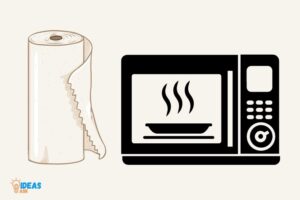What is the Paper Towel Effect? Find Out!
The Paper Towel Effect is a cognitive concept that describes how minor inconveniences or issues, when left unaddressed or accumulated over time, can have a significant and noticeable impact.
It is akin to the gradual depletion of a roll of paper towels through the continuous use of seemingly insignificant sheets.
This phenomenon can be observed in various domains, such as personal finance, health, work, and relationships, where small problems may initially seem trivial but can lead to substantial consequences when they accumulate.
Recognizing the Paper Towel Effect emphasizes the importance of addressing minor issues promptly to prevent them from becoming more significant challenges in the long run.

Key Takeaway
Understanding The Paper Towel Effect
Definition of the Paper Towel Effect
The Paper Towel Effect refers to a cognitive phenomenon in which a minor inconvenience or issue accumulates and becomes more significant over time.
This concept is aptly named after the analogy of a paper towel. Just as a single sheet of paper towel seems inconsequential, the act of repeatedly using and discarding these seemingly insignificant sheets results in a noticeable depletion of the roll.
Similarly, small daily inconveniences or issues may appear trivial individually, but as they accumulate, their collective impact can become substantial.
Significance of the Paper Towel Effect in Everyday Life:
The Paper Towel Effect holds notable significance in our daily lives for several reasons:
Decision-Making
It influences our choices and decisions. Often, people opt for convenience or short-term benefits without considering the long-term consequences. This can apply to various aspects of life, from consumer choices to personal habits.
Resource Management
The concept extends to the efficient utilization of resources. Just as using an entire roll of paper towels for minor spills is wasteful, mismanaging resources in daily life can lead to inefficiency and unnecessary consumption.
Environmental Impact
In the context of sustainability, the Paper Towel Effect underscores the importance of recognizing how small, repeated actions can contribute to environmental problems.
Excessive use of disposable products, for instance, can lead to resource depletion and increased waste in landfills.
Behavioral Patterns
Understanding the Paper Towel Effect can help individuals become more mindful of their behavior and habits.
It encourages people to consider the long-term consequences of their actions, promoting responsible decision-making.
Economic Considerations
The Paper Towel Effect can have financial implications. Small, daily expenses that go unnoticed can add up over time, affecting one’s overall financial health. Recognizing and mitigating these effects can lead to cost savings.
Psychological Impact
Accumulating minor inconveniences or issues can also have a psychological impact, contributing to stress and frustration. Recognizing and addressing these issues can lead to improved well-being.
The Paper Towel Effect is a concept that reminds us to be mindful of the cumulative impact of small actions and inconveniences in our daily lives.
By understanding this phenomenon, individuals can make more informed decisions, reduce waste, and contribute to a more sustainable and balanced lifestyle.
Factors Influencing this Paper Towel Effect
The Paper Towel Effect is a fascinating concept that reflects how minor inconveniences or issues can accumulate and have a significant impact over time.
Several factors influence this phenomenon, both in terms of individual experiences and broader societal contexts.
Here are some key factors that contribute to the Paper Towel Effect:
Psychological Bias
Human beings have a tendency to underestimate the cumulative impact of small events or changes. This psychological bias can make it challenging for individuals to recognize the significance of minor inconveniences until they have added up substantially.
Threshold Effect
There may be a threshold at which the accumulation of minor inconveniences reaches a tipping point, making the impact suddenly more noticeable.
This threshold can vary from person to person, depending on their tolerance for small inconveniences.
Normalization
People tend to adapt to minor inconveniences over time. What initially seems bothersome may become the new normal, making it harder to notice the cumulative impact until it is extreme.
Availability Bias
People are more likely to notice and remember significant events or inconveniences rather than the smaller ones.
This can create a bias in perception, where individuals pay more attention to the major issues while ignoring the smaller, accumulating inconveniences.
Inertia
The Paper Towel Effect can be exacerbated by a lack of action to address or mitigate the minor inconveniences. Inertia or a reluctance to take action can allow these issues to accumulate over time.
Context and Environment
The context in which people live or work can greatly influence the Paper Towel Effect. Some environments may be more prone to accumulating minor inconveniences, while others are better at addressing and preventing them.
Time Perspective
The perception of time plays a role. When people focus on short-term benefits or immediate gratification, they may neglect the long-term consequences of accumulating inconveniences.
Social and Cultural Factors
Societal norms and cultural expectations can influence how individuals perceive and respond to minor inconveniences.
In some cultures, people may be more proactive in addressing them, while in others, there may be a greater tolerance for enduring them.
Economic and Resource Constraints
Limited resources or financial constraints can make it difficult for individuals or organizations to address minor inconveniences, leading to their accumulation.
Communication and Feedback Loops
Effective communication and feedback mechanisms can help individuals and organizations identify and address minor inconveniences before they accumulate. Lack of such mechanisms can contribute to the Paper Towel Effect.
Leadership and Decision-Making
In organizations and communities, leadership and decision-making play a crucial role in addressing or allowing the accumulation of minor inconveniences.
Effective leadership can proactively address these issues, while poor leadership may exacerbate them.
Understanding these factors can help individuals and organizations recognize and mitigate the Paper Towel Effect.
By proactively addressing and preventing minor inconveniences, the cumulative impact can be minimized, leading to a more efficient and enjoyable experience.
The Science Behind The Paper Towel Effect
The concept of the “Paper Towel Effect” is a useful metaphor for understanding how small inconveniences or issues can accumulate and have a significant impact on our overall well-being and satisfaction.
While it’s not a well-established scientific theory, it can be related to several cognitive and psychological principles.
Here are some key aspects of the science behind the Paper Towel Effect:
Cognitive Load:
One psychological principle at play in the Paper Towel Effect is cognitive load. Cognitive load refers to the mental effort required to process information and make decisions.
Small inconveniences or issues, when they occur repeatedly, can add to our cognitive load. Over time, this cumulative cognitive load can lead to stress, reduced mental resources, and a decreased sense of well-being.
Hedonic Adaptation:
Hedonic adaptation is the tendency of individuals to quickly return to a relatively stable level of happiness or satisfaction after a positive or negative life event.
Small inconveniences can trigger negative emotions, and if they persist, we may adapt to these negative feelings and accept them as the new normal. This can lead to a gradual decline in overall well-being without us even realizing it.
Stress and Health:
Chronic exposure to minor inconveniences or stressors, even if they seem trivial individually, can have a cumulative effect on our physical and mental health. Prolonged stress can lead to various health issues, including increased risk of heart disease, depression, and anxiety.
Decision Fatigue:
The repeated need to make decisions, even small ones, can contribute to decision fatigue. When you encounter many minor inconveniences throughout the day, each requiring a decision or action, you may become mentally exhausted, affecting your ability to make sound decisions and prioritize important tasks.
Systematic Desensitization:
Over time, individuals may become desensitized to small inconveniences. This means that they become less responsive to these minor issues and may overlook their cumulative impact. The Paper Towel Effect reminds us to be mindful of these small inconveniences and not ignore their potential consequences.
Psychological Resilience:
Psychological resilience is the ability to adapt and bounce back from adversity. The Paper Towel Effect can erode psychological resilience by continually adding stressors and reducing an individual’s capacity to cope effectively.
The Paper Towel Effect is not a formal scientific theory but a metaphor that helps us understand the cumulative impact of minor inconveniences and issues on our well-being.
It underscores the importance of recognizing and addressing these issues to maintain a healthier and more balanced life. It also highlights the need for strategies to manage and reduce the cognitive load associated with daily hassles and stressors.
Real-life Examples of the Paper Towel Effect
The Paper Towel Effect, also known as the “Paper Towel Theory,” is a concept that illustrates how small changes or inconveniences can have a cumulative and significant impact over time.
Here are some real-life examples from different domains:
- Debt Accumulation: Using credit cards for small, non-essential purchases can lead to a substantial credit card debt over time due to interest and fees.
- Health and Fitness: Skipping workouts and indulging in unhealthy snacks regularly can result in weight gain and deteriorating health.
- Procrastination in Work: Delaying small tasks at work might not seem significant initially, but it can lead to missed deadlines and increased stress as the tasks accumulate.
- Environmental Pollution: Using disposable coffee cups and plastic utensils daily can contribute to the growing problem of plastic waste in landfills and oceans.
- Stress and Mental Health: Ignoring or dismissing minor stressors can lead to chronic stress and mental health issues over time.
- Home Maintenance: Neglecting small repairs or maintenance tasks in a home can result in significant and costly issues down the line.
- Skill Erosion: Failing to practice a musical instrument or a foreign language regularly can lead to a decline in proficiency, even if each day’s lapse seems minor.
- Relationship Neglect: Not addressing small conflicts or miscommunications in a relationship can accumulate and strain the partnership over time.
In each of these examples, the Paper Towel Effect manifests as the gradual accumulation of seemingly minor inconveniences or issues that, when left unaddressed or unmanaged, result in a noticeable and often negative impact.
This concept serves as a reminder of the importance of addressing small problems and inconveniences in a timely manner to prevent their cumulative effects from becoming overwhelming or detrimental.
Strategies for Minimizing the Paper Towel Effect
To minimize the Paper Towel Effect and prevent the accumulation of minor inconveniences or issues over time, you can employ various strategies across different aspects of your life:
- Proactive Problem Solving: Identify and address minor issues as soon as they arise, rather than postponing them. This prevents them from accumulating and becoming more significant.
- Time Management: Use time management techniques such as the Pomodoro Technique to allocate specific time blocks for tasks and prevent procrastination.
- Financial Management: Create a budget and track your expenses to avoid unnecessary spending. Pay off credit card debt and other loans promptly to prevent interest from accumulating.
- Health and Fitness: Establish a regular exercise routine and maintain a balanced diet to prevent weight gain and health issues.
- Environmental Responsibility: Reduce your use of disposable plastics and adopt eco-friendly practices to minimize your contribution to environmental pollution.
- Skill Maintenance: Practice and reinforce your skills or hobbies regularly to prevent skill erosion. Consistency is key in skill improvement.
- Stress Management: Develop stress management techniques, such as meditation or mindfulness, to address stressors before they accumulate and affect your mental health.
- Communication in Relationships: Maintain open and honest communication with your loved ones to address conflicts and misunderstandings promptly.
- Home Maintenance: Create a home maintenance schedule to address minor repairs and tasks regularly, preventing them from becoming major issues.
- Set Clear Goals: Establish clear goals and break them down into manageable tasks. This helps you stay focused on what needs to be done and prevents the accumulation of unfinished projects.
- Regular Assessments: Periodically assess your progress in various aspects of your life, identify areas where small inconveniences are accumulating, and take action to address them.
- Automate Routine Tasks: Automate repetitive tasks or use technology to streamline processes, reducing the likelihood of manual errors or neglect.
- Self-Discipline: Cultivate self-discipline and self-control to avoid impulsive actions that can lead to the Paper Towel Effect.
- Seek Professional Help: When faced with complex issues or those beyond your expertise, seek professional assistance early to prevent minor problems from becoming major crises.
- Learn from Mistakes: Reflect on past experiences and learn from mistakes. Understanding the consequences of the Paper Towel Effect can motivate you to take preventive action in the future.
By implementing these strategies, you can reduce the impact of the Paper Towel Effect and maintain a proactive and organized approach to various aspects of your life.
Addressing minor inconveniences and issues promptly can lead to a more manageable and fulfilling life in the long run.
Conclusion
The Paper Towel Effect is a cognitive phenomenon that reminds us of the significance of small, seemingly inconsequential actions or issues when they accumulate over time.
By recognizing this effect, we can take proactive steps to minimize its impact in different aspects of our lives.
Whether it’s in financial management, health and fitness, relationships, or skill improvement, addressing minor inconveniences promptly can prevent them from growing into significant challenges.
The strategies outlined earlier, such as proactive problem-solving, time management, and regular assessments, offer effective ways to combat the Paper Towel Effect.
Ultimately, the Paper Towel Effect underscores the importance of being proactive, organized, and mindful in our daily lives.
By doing so, we can prevent the accumulation of minor issues and maintain a healthier, more harmonious, and successful life journey.






